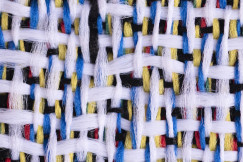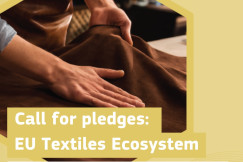Articles
18 June 2025
Circular Economy and the Future of Made in Italy: Insights from the 2025 National Conference
Articles
18 June 2025
Infrastructure
R&I, techniques and technological solutions
Social dimension
+7 more
Login / create an account to be able to react
-
3

The 7th National Conference on Circular Economy, held in Rome on May 15th, 2025, gathered Italian and European stakeholders to discuss how circularity can help revitalize the Made in Italy industrial model. With a strong focus on innovation, consumer behaviour, and sectoral transformation, the event highlighted new data on Italy’s circular economy performance, explored biotechnology and critical raw materials, and presented practical case studies from leading industries—including textiles. The conference reaffirmed circularity as a key driver of resilience, competitiveness, and alignment with the European Green Deal.
Topics
Albania
Armenia
Austria
Belgium
Bosnia and Herzegovina
Bulgaria
Croatia
Cyprus
Czechia
Denmark
Estonia
EU-27
Finland
France
Georgia
Germany
Greece
Hungary
Iceland
Ireland
Italy
Kosovo
Latvia
Liechtenstein
Lithuania
Luxembourg
Malta
Moldova
Montenegro
Netherlands
North Macedonia
Norway
Poland
Portugal
Romania
Serbia
Slovakia
Slovenia
Spain
Sweden
Switzerland
Türkiye
Ukraine
Other
Business Support Organisation
Company with 250 or more employees
Cluster Organisations
EU Institutions
Financial Institutions and Investors
Industry Associations and Chambers of Commerce
Local Authorities
National authorities
NGOs / Non-profits
Regional Authorities
SMEs (a company with less than 250 employees)
Social Economy Entity
Trade Unions
Other
-
Transition Pathway's building blocks
-
-
Infrastructure
-
R&I, techniques and technological solutions
-
Social dimension
-
Sustainable competitiveness
-
Regulation and public governance
-
-
Industrial ecosystems
-
-
Textile
-
-
Textiles ecosystem areas
-
-
Fibres, yarns and fabrics
-
Apparel and clothing accessories
-
Research and Innovation
-
Waste management, reuse and repair
-
Share
On 15 May 2025, the Biblioteca Nazionale Centrale in Rome hosted the 7th edition of the Conferenza Nazionale sull’Economia Circolare, promoted by the Circular Economy Network in collaboration with ENEA. Taking place in a context of prolonged industrial slowdown and rising global instability, the conference tackled a central question: how can circular economy strategies contribute to revitalizing the Made in Italy industrial identity?
The event opened with institutional greetings from the Italian Ministry of Environment and featured the launch of the 2025 Italian Circular Economy Report. Presented by Edo Ronchi, President of the Foundation for Sustainable Development, the report offered updated data on national circularity indicators and cross-country comparisons within the EU. A key message emerged: circularity is not only an environmental imperative, but also a competitive advantage for European industries.
Particularly relevant to the textile and fashion sectors were discussions on sustainable value chains and consumer behavior. Contributions from CNA Federmoda and other key federations emphasized the urgency of embedding eco-design, material traceability, and circular consumption practices across the industry. These themes resonate closely with the objectives of the EU Strategy for Sustainable and Circular Textiles and upcoming related requirements.
The conference also spotlighted biotechnology's growing role in circular innovation, as well as the critical need to secure sustainable access to raw materials. A consumer survey conducted in collaboration with Legacoop and Ipsos revealed increasing public awareness and demand for circular options, underlining the importance of transparent information and responsible product design.
In the afternoon session, practical case studies brought the concepts to life. Italian companies and consortia—including Burgo Group, Montello, Novamont, and CONAI—shared experiences of how circular practices are being implemented to boost competitiveness, reduce environmental impact, and foster innovation. These examples serve as blueprints for other sectors, including fashion and textiles, which are increasingly under regulatory and market pressure to become circular.
As the EU continues to roll out its Green Deal, Ecodesign for Sustainable Products Regulation (ESPR), and related policy tools, the Italian experience showcased at CEN2025 demonstrates how national-level collaboration, data-driven strategy, and private-sector commitment can make the circular transition not only viable, but beneficial.
Comments (0)
See also
-
7
Welcome to the 'Competitive and Innovative Supply Chains' Workspace
- Categories
- Infrastructure Investments and funding R&I, techniques and technological solutions +16 more
-
7
Welcome to the ‘Sustainable Business’ Community Workspace
- Categories
- Infrastructure Investments and funding R&I, techniques and technological solutions +19 more
-
87
The power of pledges: driving sustainable transformation in the EU Textiles Ecosystem
- Categories
- Infrastructure Investments and funding R&I, techniques and technological solutions +16 more




